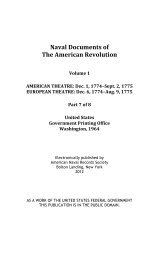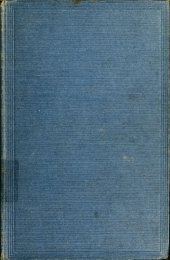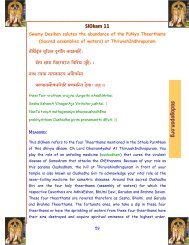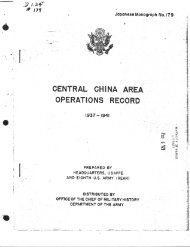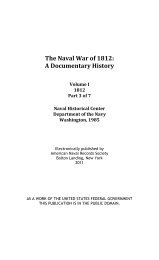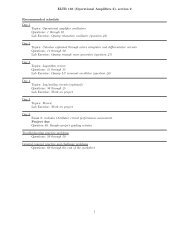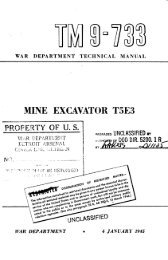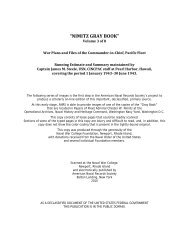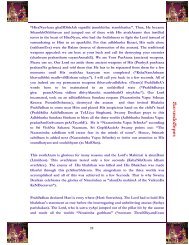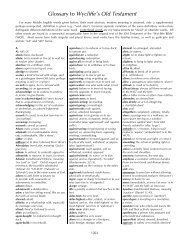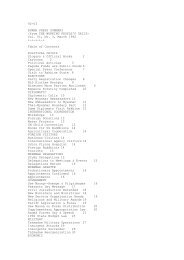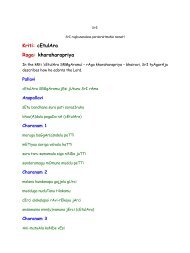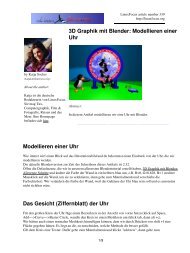Italian Bookshelf (download as PDF) - Ibiblio
Italian Bookshelf (download as PDF) - Ibiblio
Italian Bookshelf (download as PDF) - Ibiblio
You also want an ePaper? Increase the reach of your titles
YUMPU automatically turns print PDFs into web optimized ePapers that Google loves.
478 “<strong>Italian</strong> <strong>Bookshelf</strong>.” Annali d’italianistica 25 (2007)<br />
Curran concludes by suggesting further study on <strong>as</strong>pects of women’s poetry, which,<br />
although important, are not yet fully understood.<br />
The remarkable chapter by Ann Rosalding Jones, “Bad Press: Modern Editors<br />
Versus Early Modern Women Poets (Tullia d’Aragona, G<strong>as</strong>para Stampa, Veronica<br />
Franco),” discusses the reordering, censoring and false expansion of the original texts by<br />
the above-mentioned writers by three editor-critics of the late nineteenth and the early<br />
twentieth centuries. The interest of these textual revisions lies, Jones affirms, in the<br />
revelation of the gendered <strong>as</strong>sumptions which form the b<strong>as</strong>is of the canonization of early<br />
modern European women. To the list created by Joanna Russ in her book How to<br />
Suppress Women’s Writing, that includes “denial of agency,” “pollution of agency,”<br />
“demeaning categorization,” and “isolation,” Jones suggests the addition of “purification<br />
of agency,” aimed at transforming the woman writer’s work to fit a definition of<br />
acceptable feminine authorship (308). After denouncing the double standard by which<br />
men and women writers are held, Jones suggests that future editors preserve the authors’<br />
original publication from beginning to end.<br />
Lina Insana’s “F<strong>as</strong>cist Appropriations: The C<strong>as</strong>e of Jolanda De Bl<strong>as</strong>i’s Le scrittrici<br />
italiane” well proves that this 1930 collection of women’s writing w<strong>as</strong> the most<br />
comprehensive in Italy to date and that De Bl<strong>as</strong>i’s criticism w<strong>as</strong> strongly bi<strong>as</strong>ed. The<br />
largest chapter in the collection is devoted to the fifteenth and sixteenth centuries, another<br />
period in <strong>Italian</strong> history, according to Insana, in which the “woman question” w<strong>as</strong> <strong>as</strong><br />
important in the social and literary agend<strong>as</strong> <strong>as</strong> during the 1930s. Insana detects a central<br />
contradiction in De Bl<strong>as</strong>i’s work: while its literary and historical component harshly<br />
disparages most poetic production by women, its collection is the most comprehensive to<br />
date. De Bl<strong>as</strong>i equates inferior morality to inferior poetry, thus blurring the lines between<br />
public and private domains, also a hallmark of F<strong>as</strong>cist policies and legislation. Finally,<br />
Insana judges De Bl<strong>as</strong>i’s work <strong>as</strong> participating “in the overall cultural program of<br />
F<strong>as</strong>cism, which w<strong>as</strong> to place its ideal woman at the center of a pro-family, pronatalist<br />
society […] <strong>as</strong>serting its right to legislate the private in the interests of the public” (332).<br />
In the l<strong>as</strong>t chapter of the collection, “A Woman for All Se<strong>as</strong>ons: The Reinvention of<br />
Anne Askew,” Elaine Beilin shows how religious texts by women have lacked, until<br />
recently, full critical appreciation and how deep and perv<strong>as</strong>ive the process of<br />
“deauthorization” on the part of publishers and editors can be. Since the first publication<br />
of the Examinations in 1546, Askew’s work became a mere proof of its author’s<br />
martyrdom for the Protestant faith. Even the latest “reinvention” of her life and death, a<br />
1998 episode in The Learning Channel’s Tales from the Tower, represents Askew <strong>as</strong> a<br />
victim of torture and burning at the stake, but not at all <strong>as</strong> a writer. According to Beilin,<br />
the exception to this representation is the 1965 fictional novel by Alison Macleod The<br />
Heretics, which restores Askew <strong>as</strong> a woman, a martyr, and a writer at the same time.<br />
The breadth of the collection, the excellent quality of the critical commentaries and<br />
the bridging of national and temporal lines make this text a “must read” for any student<br />
and scholar of the early modern period and a great addition to any public and private<br />
libraries.<br />
Paola Malpezzi Price, Colorado State University



